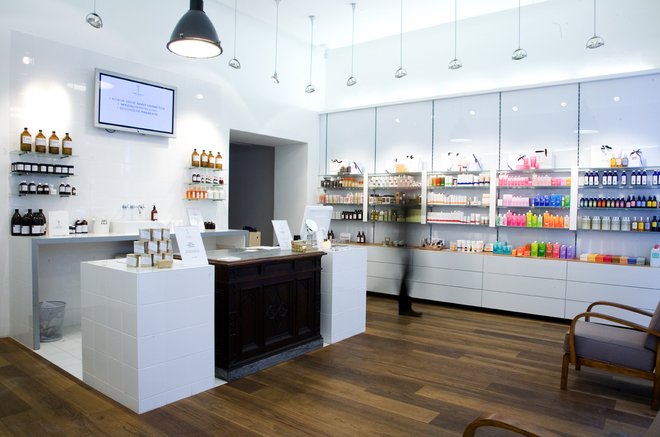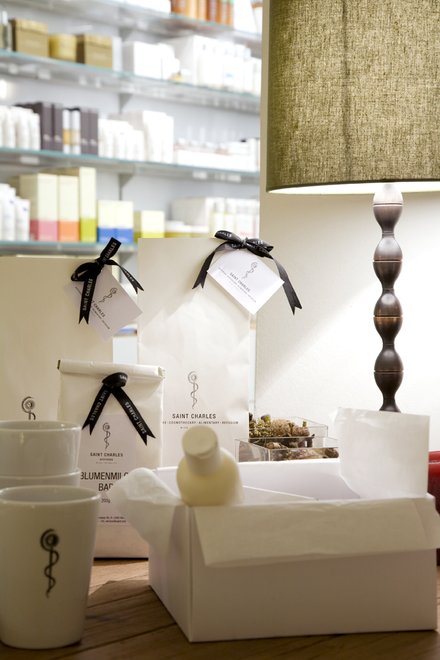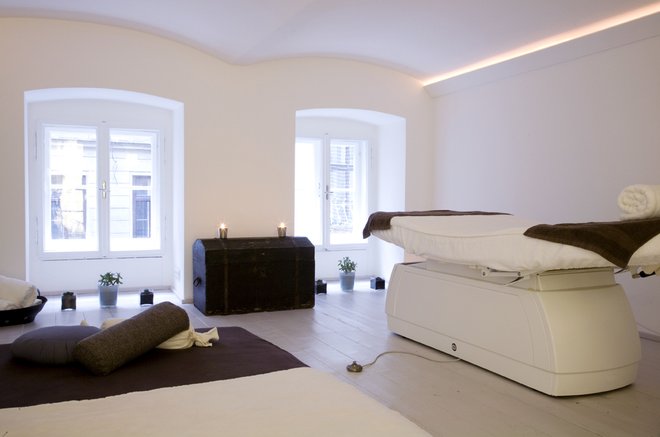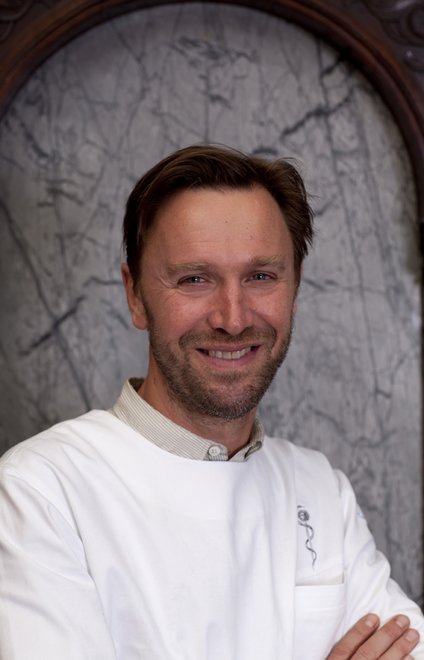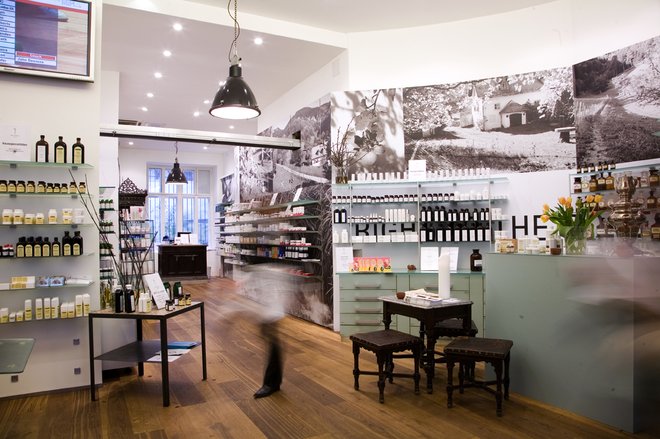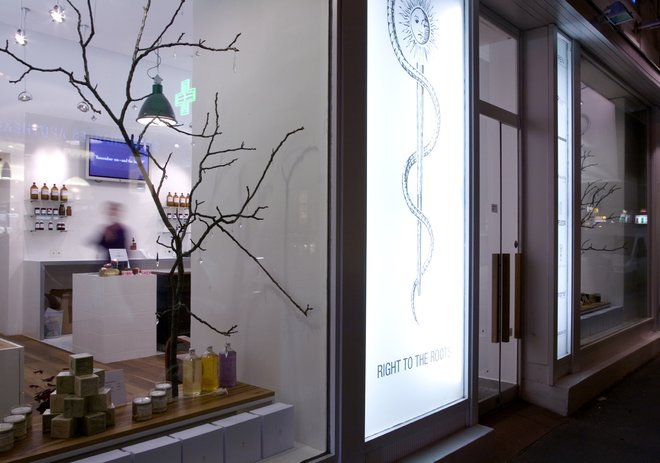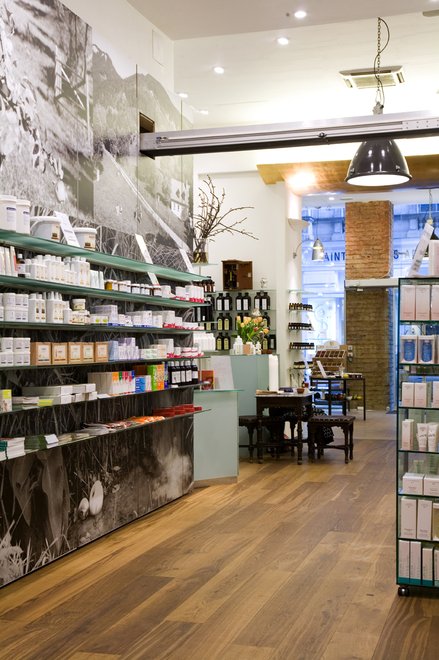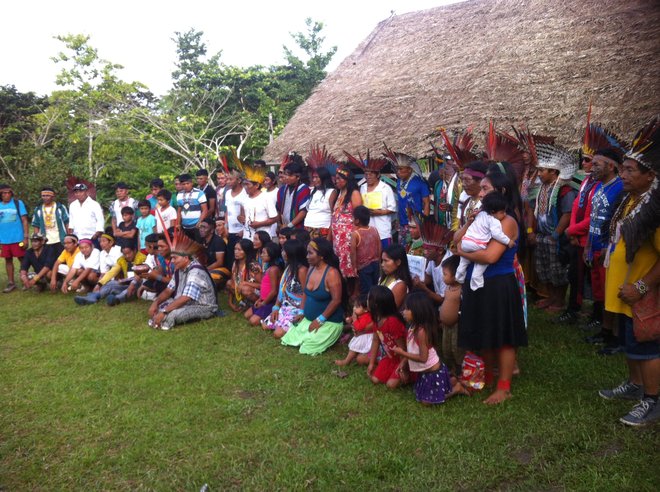Dreams And Tinctures
Alexander Ehrmann is a sixth-generation pharmacist. Already as a child he concocted his first tinctures and tonics in the parental cellar. We spoke with him about dream-inducing toothpaste and his personal “jungle camp” experiences.
Since 2006 Ehrmann has been running Vienna’s legendary Saint Charles pharmacy, which has evolved into a little empire with a restaurant, a natural cosmetics line, a treatment area, a branch in Berlin, and since recently an own online shop. This year the pharmacy celebrates its 130th anniversary.
Werner Sturmberger & Anneliese Ringhofer: Your career started out in the cellar of your parents…
Alexander Ehrmann: Yes, I mostly mixed tonics there. It was incredibly exciting. A Mister Fedrigotti, a wine vendor from Italy, used to come down into the cellar and bring Refosco. This was the wine used to steep herbs in vats. The brew was stirred with huge sieves. You had to do it every day. Of course, I must have inevitably inhaled the vapor, which explains my great love for wine and perhaps also my grades in school at the time! (laughs)
Nevertheless, you didn’t become an enologist but a pharmacist…
For some reason it was clear that I would become a pharmacist – like everyone else in the family. My sister, however, a zodiac Leo, was the only one who refused and said: “No way, not me!” She was more the revolutionary of us two and joined in on the occupation of the Hainburg wetlands back then, now a natural reserve close to Vienna. I was little, but I can clearly remember it: She drove there with her very unsustainable Citroën 2CV, one of the biggest polluters there is… But for a short while I did play with the thought to study directing at the Reinhardt Seminar school of drama.
Where does your affinity for theatre come from?
I was fascinated by the theatre already as an adolescent. A friend of my mother is an actress and encouraged my passion in this direction. But also our pharmacy is a great show! We are not like any old pharmacy; there’s always something going on. Naturally, I’m often enough the “showmaster” as I really enjoy spinning out ideas and develop new things.
What are you working on right now?
We started our online shop at the beginning of the year, which involved a great deal of work. We are also developing something we call “Bio-Anti-Bio”. Right now it’s in the test phase, but I don’t know just yet if it will become an established product. It’s a strong but natural antibiotic. Onions, garlic, hot chili peppers, ginger, and curcuma are steeped in vinegar for several weeks. The stock has a gigantic antibiotic potential.
"Many aromatic substances even have a medical effect."
And we heard you are working on a new perfume, too?
Yes, currently I’m working on a new series of fragrances together with my artist friend Paul Divjak. The name is “Wiener und Wienerin von Welten”. It’s two types of scents packaged in a wooden display, like you know from oil and vinegar. One goes a bit in the citrus direction, while the other is more tangy and heavier.
“Wiener und Wienerin von Welten”, what an extravagant name for a perfume! What’s that about?
Wiener von Welten was the name of a Jewish family that was extinguished in the Shoa. But there is still a palace on Schwarzenbergplatz they built in the Ringstraße style. (The one with the urban vineyard in front, the smallest in Vienna, a special feature in the city – editor’s note) We found the name interesting. Paul is also dealing with the history of Judaism in Vienna and writes for a Jewish magazine. The name of the fragrance should also be a form of memory. My son plays in the Jewish soccer club Maccabi as a striker. So all this fits together quite well.
You seem to find perfumes pretty fascinating. Why?
I am Viennese by birth but grew up in Seekirchen on Wallersee Lake in Salzburg. My mother was an absolute exotic there. She was the only one in a 50-kilometer radius who had a VOGUE subscription. You could say, this was my first access into the glamorous world of fashion and cosmetics. It fascinated me.
Later on, I discovered what scents are capable of, apart from their psychological component. Many aromatic substances even have a medical effect. Thyme, for example, is a brilliant bacteria killer. But one must take care to get the ingredients in an appropriate quality. You can also ingest them when they have a biological quality. Working intensely on that level is a part of our holistic approach.
"Having time is a big factor. Idleness! Contemplating! How inspiring!"
Why is the complementary or alternative approach to medicine so important to you?
Of course, we also sell classic antibiotics and medication. That’s only logical. But conventional medicine has also led to a certain irresponsibility. When you’re not feeling well, you simply take a pill. People have forgotten how to analyze what is good for their body. When you take some time for yourself, do a bit of yoga once per day, that’s recreation. Also when you keep in mind to use eco-products. The body and the skin recognize what is identical to nature. Products based on petroleum are not absorbed so well and are rejected. These are solid arguments!
Are you “eco-dogmatic”?
No, I just observe that I feel better when I eat organic food. Time and again, I have my aha-moments in this regard. Just recently I visited a meeting of the Demeter society on the countryside of northern Waldviertel. Farmers meet there twice a year. It was great. I rhythmized horseshit for an hour.
Rhythmized horseshit? What does that mean?!
You walk around in circles with a shovel and lift it over and over again while telling each other exciting stories. The dung is then filled in cow horns and buried – more than 3000 altogether. Over time this becomes fertilizer. Not only the fact that it works is great, also what you experience with these people. There’s wonderful food and you chat away. These are people with their feet on the ground, not spaced-out hippies. I’m impressed just how carefully they treat themselves, nature, and what they produce.
"That a researcher invented LSD not to get high but for use in therapy."
What does true pleasure mean for you?
That’s incredibly important to me. It must run in the family DNA. My father was and is an extreme hedonist. My mother never indulged that much, perhaps because she’s a Capricorn. Recently I ask myself what pleasure actually is. For me, it means that my wife and I stand almost every Sunday at 10 o’clock – no matter if it’s rainy or cold – at the soccer field and cheer for our son. Pleasure is to meet with my tarot group once a week. Having time is also a big factor. Idleness! Contemplating! How inspiring! Also hanging out in our farmhouse in Prigglitz (Lower Austria) is pure pleasure – no cell phone reception, lying in the hammock, dozing off a bit, looking up in the sky. That’s the most productive time for me!
Do you enjoy working together with your wife?
Totally. It’s a great pleasure to be creative together with my wife Ruth. She’s really committed to the Saint Charles Complementary, our center for therapists, doctors, and yoga teachers. And I just love to climb up a mountain, trying to keep pace with our son, realize that I won’t succeed, and then, slowly and calmly, hand-in-hand, we reach the summit. Wonderful!
Are you very connected to nature? It seems you go to your farmhouse in Prigglitz quite often …
It’s a 300-year-old farmhouse, which we acquired together with three other families. We use it privately but also in connection with the Tralalobe association, the Caritas Catholic charity, and the Diakonie social welfare organization. We offer summer camps for unaccompanied adolescents from crisis regions. Their life stories really touch me. As a follow-up, we try to find jobs for the youth. This is a form of integration that works really well.
Would you describe yourself as down-to-earth or more spiritual?
I am down-to-earth, but this doesn’t rule out a certain form of spirituality. I find it fascinating what we humans are capable of. How many unexploited capacities and energies a human being possesses. In my diploma thesis I dealt with neuro-receptors. Questions like what happens when you’re jogging, the release of endorphins or the effect of psychedelic drugs. That a researcher invented LSD not to get high but for use in therapy, I find incredibly interesting. Until people found it got out of hand and said let’s forbid everything altogether.
"It’s pretty fascinating what substances nature has in store."
You seem to be well versed with psychedelic substances?
I’m quite glad that most people don’t know what is growing on the roadside around here. (laughs) It’s pretty fascinating what substances nature has “in store”. In Brazil, for example, ayahuasca is popular, a hallucinogenic plant brew made from a South American type of liana. This is not a party drug; it’s medicine only used in a ceremonial context by indigenous peoples of the Amazon rain forest. This liana is only active when you also ingest the leaf. Otherwise, an endogenous enzyme would cause the agent to be immediately dissipated. The leaf contains a complementary inhibitor. When both are combined the desired psychedelic effect ensues.
You also know so much about it as you were in the Brazilian jungle together with the art collector Franscesca von Habsburg, right?
I’ve already worked as a pharmacist in the art context on other occasions. For the exhibition “Leben” by Carsten Höller at TBA21 in Vienna I even mixed a dream-stimulating toothpaste.
The next thing was for the exhibition “Aru Kuxipa – Sacred Secret” by the Brazilian artist Ernesto Neto at the same venue (June to October 2015). He had worked together with shamans of the Huni Kuin tribe in Acre on the border to Peru and wanted to invite some of them to Vienna. In order to clarify things Ernesto, Francesca von Habsburg, and the curator Daniela Zyman of TBA21 flew there. Ernesto said: “Please take the pharmacist with you, too!” Done. Everything was incredibly weird and exciting! I was sort of the white medicine man there. Incidentally, I told the locals a lot about our traditional European medicine.
From Brazil to Vienna’s urban jungle – do you like the city?
There are a lot of things here I really don’t like. This “Let’s see” mentality, meaning nothing comes of it but you try to wriggle your way through somehow – I don’t like that. But there is a fundamental energy here, which makes a lot of things possible. A creativity which has retained a certain serenity that many other places don’t have anymore. What I find cool about Vienna are the “other sides” of the city that many bobos don’t know at all, this “Vienna of the Viennese”. Things like the Danube wetlands or the Gänsehäufel public bath. They are fantastic, unique. Also the whole Heurigen wine tavern thing definitely has character.
Has your son already showed interest in continuing the family tradition?
Once per year we invite his classmates to our home. Then he definitely likes to demonstrate how to mix tonics and stuff like that. But he also plays trumpet at the moment. Whatever he decides – I won’t be in the way. At the moment he has the fixed idea that he will become a soccer pro.
Alexander Ehrmann was born in Vienna in 1967. At the age of three he moved to Seekirchen on Wallersee Lake in Salzburg with his parents. Barely able to walk he already mixed tonics, ointments, and all kinds of obscure pharmaceutical tinctures in the evenings. During his studies in Vienna he did diverse internships at pharmaceutical firms in Austria and abroad, along with various side jobs for survival (night porter, chauffeur, gastronomy). Since completion of his studies Mag. pharm. Alexander Ehrmann continues the family tradition as a pharmacist in the sixth generation.



